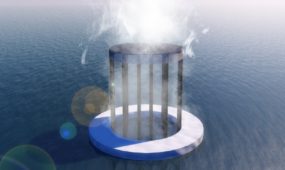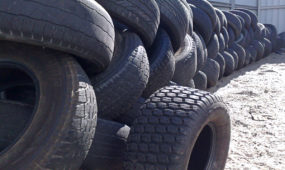Getting a grip on shark safety
Research & Development
IF it’s good enough for mosquitoes and grizzly bears then why not sharks?

Sign up to receive notifications about new stories in this category.
Thank you for subscribing to story notifications.
That’s part of the reasoning behind Neil Campbell’s Chillax Surf Wax, which aims to keep sharks away from surfers.
Campbell moved to Adelaide, the capital of South Australia, from Sydney last year and has dedicated the past 12 months to developing a pungent surf wax to prevent surfers from smelling “like shark food”.
He said the idea stemmed from his childhood fear of going into the ocean and being attacked by a shark.
“I used either Tiger Balm or tea tree oil as part of this instinctive private idea that I wouldn’t smell like shark food – that idea appears to have lingered and I’ve made it grow up,” Campbell said.
“I had it in my head when I arrived because the week before I left I had an encounter with a big bronze whaler or a bull shark off Long Reef in Sydney near sunset and I just swore to myself that I’d never be so stupid to be out there without a strategy again.
“So from the moment I got here I got stuck in to how to make an organic wax and how to make the smell I had in mind come out.”
The natural ingredients in the wax include eucalyptus, chilli, cloves, cayenne pepper, neem, tea tree oil, citronella, coconut and beeswax.
“The essential idea is that you’ll smell different from shark food but more to the point there are a number of combinations of these natural smells and spices that are used as deterrents, specifically for grizzly bears, dogs, leaches, brown snakes and of course mosquitoes and flies,” Campbell said.
“It’s not just willy-nilly, all of them have a track record in some way or another.”
Citronella and neem are well known for their ability to deter mosquitoes.
Studies in North America have found capsicum sprays can be effective at deterring free-roaming grizzly bears.
“It’s roughly the same formula that you would use to repel a grizzly bear from a campsite,” Campbell said.
“He’s a predator and he’s interested in blood and he’s olfactory.”
The broadcast cameraman has put his career on hold to pursue the business and was recently a finalist in a Shark Tank style pitch contest for Flinders University Venture Dorm graduates.
He has so far given samples of the wax away to be circulated among the surf community in South Australia, New South Wales and Victoria and had even sent blocks to the United States.
Campbell said he hoped to incorporate necromones – putrefied shark tissue extractions that can produce repellent responses in sharks – into the product in the next six months.
“I think I’m on the right track with this simple strategy of effectively masking yourself with something that’s very unpleasant to him,” he said.
“And it’s actually not a bad surf wax as well.
“For the time being we claim this is a deterrent, a defensive strategy for throwing the shark off our scent but we hope to move to a product with a more aggressive strategy of defence with necromones and that would be next.”
Dr Charlie Huveneers leads the Southern Shark Ecology Group research lab at Flinders University and has liaised with Campbell about his product.
He said no independent scientific studies had yet been carried out to test whether the Chillax Surf Wax deterred or repelled sharks.
However, he said the introduction of chemicals that could act as alarm signals, such as necromones, into the product could make it more effective.
“Anecdotal observations have shown that sharks avoid areas containing decomposing shark tissue,” Dr Huveneers said.
“Such chemical signals produced following death and decomposition of sharks are often referred as necromones. Recent studies have shown that necromones can stop the feeding behaviour of reef sharks suggesting that it has a behavioural effect on sharks.
“Whether the incorporation of necromones within other products such as a surf wax will significantly reduce the risk of a shark bite, however, remains to be tested.”
Dr Huveneers was one of the first people to test the effectiveness of shark repellents and deterrents including the electronic Shark Shield.
He said shark deterrents should be independently and scientifically tested prior to becoming commercially available.
“Having untested shark deterrents commercially available might create a false sense of security and lead people to exposing themselves to riskier situations than they normally would.”
Campbell said he hoped to independently test his product with scientists, including Dr Huveneers, in the coming months.
“I have no doubt that what we’re going to find is going to be exciting because the small amount of study I have done into sharks has revealed how much they seem to be motivated by scent,” he said.
In the meantime, Campbell continues to cook up the wax in his Maslin Beach laundry with the goal of having the product in surf shops by the coming Australian summer.
“I’m going to do a road trip with the car loaded up with as much wax as I can and go and do the New South Wales coast and as much of the coast in between as I can manage,” he said.
“I think it’s with that cottage venture first, then I want to approach independents and similarly for the more major brands and I’m expecting to get contracts in time.”
Campbell said 180 gram blocks would be priced at sell $20 while the smaller 85 gram blocks would sell for $12 – about twice the price of regular surf wax. However, he said the price would likely fall as production increased.
“It’s not just about surfing, this company wants to go on to have solutions for the swimmers and the scuba divers and the spear fishermen and the abalone divers – we want to look after everybody in the water.”
Jump to next article



